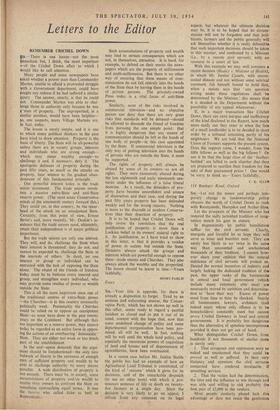Letters to the Editor
REMEMBER CRICHEL DOWN m,—There is one lesson—not the most tmmediate but, I think, the most important 4–of the Crichel Down affair to which I would like to call attention.
Many people and some newspapers have asked whether a poorer man than Commander Marten, unable to afford a protracted struggle with a Government department, could have sought any redress if he had suffered a similar knjury. The answer, clearly, is that he could not. Commander Marten was able to chal- lenge those in authority only because he was 4'man of property. The unpropertied, in a similar position, would have been helpless— as, one suspects, many Village Martens are, in fact, today.
The lesson is surely simple, and it is one to which many political thinkers in the past have tried to draw attention. Property is the basis of liberty. The State will be all-powerful unless there are in society groups, interests
and individuals who are strong enough—
which may mean wealthy enough—to challenge it and, if necessary, defy it. The
apologetic defences of property during the past fifty years, as much- as the attacks on property, bear witness to the gradual aban- donment of this fundamental principle.
One powerful interest today is the trade union movement. The trade unions consti- tute a massive extra-State and anti-State reserve power. (The most acute Conservative minds of the nineteenth century foresaw this.)
They could yet, in this country, be the spear-
head of the attack on an omnipotent State. Certainly, from this point of view, Ernest Bevin's and, more recently, Mr. Deakin's in- sistence that the trade unions must, ultimately, retain their independence is of major political importance.
But the trade unions are only one interest. They will, and do, challenge the State wheh their interest is threatened; they do not, and
cannot be expected to, challenge the State in the interests of others. In short, no one interest or group or individual can be
entrusted with the task of opposing the State alone. The object of the friends of freedom
today must be to buttress every interest and group, and strengthen every individual, who may provide some residue of power or wealth outside the State.
This is all the more important since one of the traditional centres of extra-State power —the Churches—is in this country necessarily Politically weak. Presumably the Churches could be relied on to oppose an omnipotent State—as some have done in the past twenty Years on the Continent. But although they are important as a reserve power, they cannot today be regarded as an active force in oppos- ing the actions of an overbearing ' democratic' State. They are either too weak or too much part of the establishment.
In the end—space demands that the argu- ment should be foreshortened—the only sure bulwark of liberty is the existence of enough men of sufficient property and wealth to be able to challenge authority by every means possible, A wide distribution of property is not enough. There must be, in society, some accumulations of property and/or wealth to enable their owners to confront the State on something approaching equal terms. It was the barons who called John to heel at Runnymede.- Such accumulations of property and wealth may lead to certain consequences which are not, in themselves, attractive. It is hard, for example, to defend on their merits the news- papers which are the property of millionaires and multi-millionaires. But there is no other way of ensuring that these means of com- munication do not fall entirely into the hands of the State than by leaving them in the hands of private persons. The privately-owned Press today is a vital focus of anti-State power.
Similarly, none of the risks involved in commercial television—and no objective person can deny that there are very great risks that standards will be debased—should be allowed to dissuade the friend of freedom from pursuing the one simple point: that it is highly dangerous that any means of communication should be left in the hands of one body of people—in this case appointed by the State. If commercial television is the only way of putting television into the hands of persons who are outside the State, it must be supported.
The rights of property will always be abused by some .of its owners—as are all rights. They were excessively abused during the late eighteenth and early nineteenth cen- turies under the 'influence of a false liberal doctrine. As a result, the defenders of pro- perty have become unconfident and unsure of themselves and their case, and during the past fifty years property has been defended weakly and for the wrong reasons. Nothing is more to the discredit of modern Conserva- tives than their desertion of property.
It is to be hoped that Crichel Down will help revive the conviction that the real justification of property is more than a Lockian belief in its owners' natural right to it. Its justification, as I have tried to show in this letter, is that it provides a residue of power in society but outside the State. Dictators always attack the groups and interests which are powerful enough to oppose them—trade unions and Churches. They also always attack the wealthy and the propertied. The lesson should be learnt in time.—Yours faithfully,


































 Previous page
Previous page